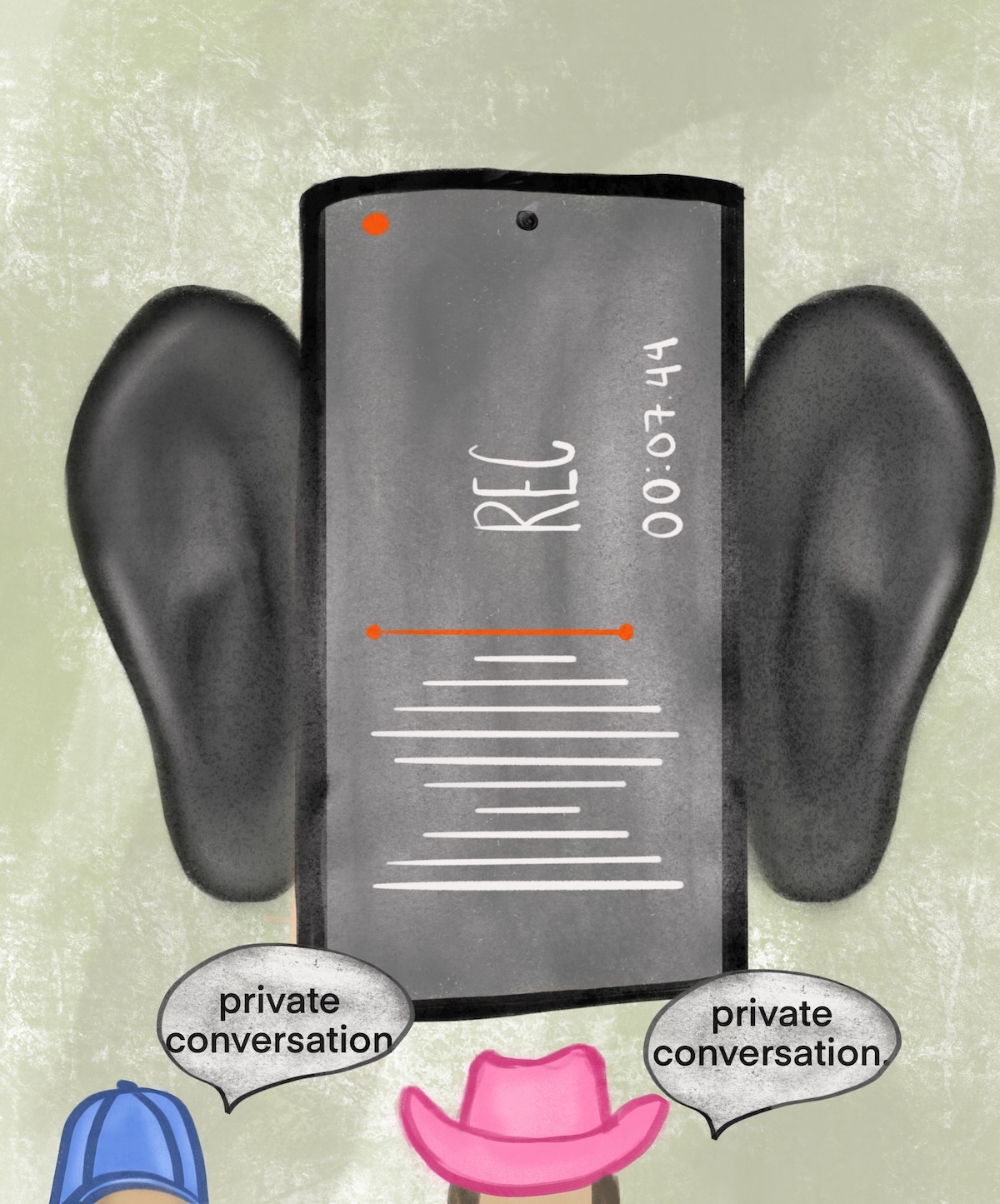Have you ever discussed going backpacking with a friend only for your Instagram feed to get filled up with tour packages and backpack recommendations? This might not just be a coincidence.
In an age where technology integrates seamlessly into every aspect of our lives, a startling revelation has emerged that may make you think twice about your relationship with your smartphone.
Recent reports have corroborated what many of us have long suspected—our smartphones may indeed be listening to our conversations and not just when we ask them to. This practice has sent shockwaves through the tech community and raised serious questions about privacy in the digital age.
The existence of this technology came to light through a series of investigative reports and leaked documents. Cox Media Group—a major player in the television and radio news industry—was found to be at the center of this controversy. In a presentation to investors, the company boasted about its Active Listening software—which uses AI to monitor conversations and capture real-time data on user intentions.
At its core, this technology utilizes the microphones in our smart devices to capture ambient conversations. These audio snippets are then analyzed using artificial intelligence to glean information about our interests, needs and potential purchasing intentions. It’s like having a tiny, ever-present marketing researcher in your pocket, constantly on the lookout for clues about what you might want to buy next.
The concept isn’t entirely new. Voice assistants like Siri, Alexa and Google Assistant have been using similar technology for years to respond to our voice commands. However, the key difference here is consent. While we knowingly activate these assistants with specific wake words, Active Listening operates silently in the background, potentially capturing our most private conversations without our explicit permission.
This software doesn’t just stop at listening. It combines the voice data with behavioral data, creating a comprehensive profile of potential consumers. The result? Hyper-targeted advertising that can reach users at the precise moment they’re considering a purchase. It’s a marketer’s dream and a privacy advocate’s nightmare.
But it’s not just Cox Media Group. The company claims to work with tech giants like Google, Amazon and Facebook—although the exact nature of these collaborations remains unclear. This revelation has sent ripples through the tech industry, with some companies scrambling to distance themselves from these practices.
As news of this technology spread, the response from major tech companies was swift. Google, for instance, removed Cox Media Group from its advertising partners program, citing the need for all advertisers to comply with relevant laws and Google Ads policies. Meta—formerly Facebook—issued a statement clarifying that their partnership with Cox Media Group was general and not specifically related to the Active Listening program.
These reactions highlight the sensitive nature of this issue as well as the potential legal and ethical minefield it represents. The use of such technology without explicit user consent could potentially violate various privacy laws and regulations—not to mention the breach of trust it represents for consumers.
For many consumers, this news confirms a long-held suspicion. A study conducted in the UK found that nearly half of the respondents reported seeing ads for products shortly after discussing or viewing them on TV without having searched for them online. This coincidence has left many feeling uneasy with one in eight participants expressing discomfort with these seemingly psychic ads. However, it is worth noting that it remains unclear whether or not technology of this nature has been implemented on a wide scale yet.
The revelation of Active Listening technology adds a new layer to this discomfort. It’s one thing to track our online activities—we’ve begrudgingly accepted this as part of the internet experience. But the idea that our offline, private conversations are being monitored and monetized feels like a step too far for many.
The use of Active Listening technology exists in a legal gray area. While companies may argue that users have consented to data collection through various terms of service agreements, it’s debatable whether these agreements adequately cover the extent of data collection that Active Listening represents.
In the United States, the lack of a comprehensive federal privacy law makes it challenging to regulate such practices effectively. The European Union’s General Data Protection Regulation (GDPR) provides stronger protections, but even there, the application of these laws to Active Listening technology is not entirely clear.
Ethically, the use of this technology raises serious concerns about informed consent and the right to privacy. Even if it’s legal, is it right to monitor people’s private conversations for commercial gain? This question is at the heart of the debate surrounding Active Listening.
As this technology continues to evolve, it’s clear that we’re at a crossroads in terms of digital privacy. The convenience and personalization offered by smart devices come at a cost, and we’re only now beginning to understand the full extent of that cost.
Moving forward, there will likely be increased pressure for more transparent data collection practices and stricter regulations around technologies like Active Listening. Consumers may demand more control over their data and the ability to opt out of such invasive tracking.
At the same time, the technology industry will need to grapple with the ethical implications of their innovations. Balancing the drive for more effective advertising with respect for user privacy will be a significant challenge in the coming years.
For those concerned about their privacy, there are steps you can take to limit the access that apps and devices have to your microphone. Most smartphones allow you to review and modify app permissions in the settings menu. You can choose which apps have access to your microphone and revoke that access for apps you don’t trust.
However, it’s worth noting that maintaining complete privacy becomes increasingly challenging as technology becomes more integrated into our lives. The most effective protection may be increased awareness and advocacy for stronger privacy protections at a legislative level.
As we reflect on the implications of Active Listening technology, we face the age-old question: Is technology a boon or a bane? The answer, as always, is complex.
On one hand, this technology represents a remarkable advancement in AI and data analysis. It has the potential to create more personalized experiences and help businesses better understand and serve their customers. In a world where we’re constantly bombarded with irrelevant ads, seeing only ads for things we’re interested in has a certain appeal.
On the other hand, the privacy implications are profound. The idea that our most private conversations could be monitored and monetized without our knowledge feels like a violation of our fundamental right to privacy. It raises concerns about the extent to which technology companies can intrude into our lives and the potential to misuse our data.
Ultimately, the impact of this technology will depend on how it’s regulated and implemented. We must remain vigilant as we move into this new world of ambient computing and ubiquitous AI. We must demand transparency from companies about their data collection practices and push for regulations that protect our privacy while allowing technological innovation.
The story of Active Listening is still unfolding, and its final chapter has yet to be written. As consumers, citizens and human beings, we all have a role in shaping that story. The future of privacy is in our hands—or perhaps more accurately, in our voices.






